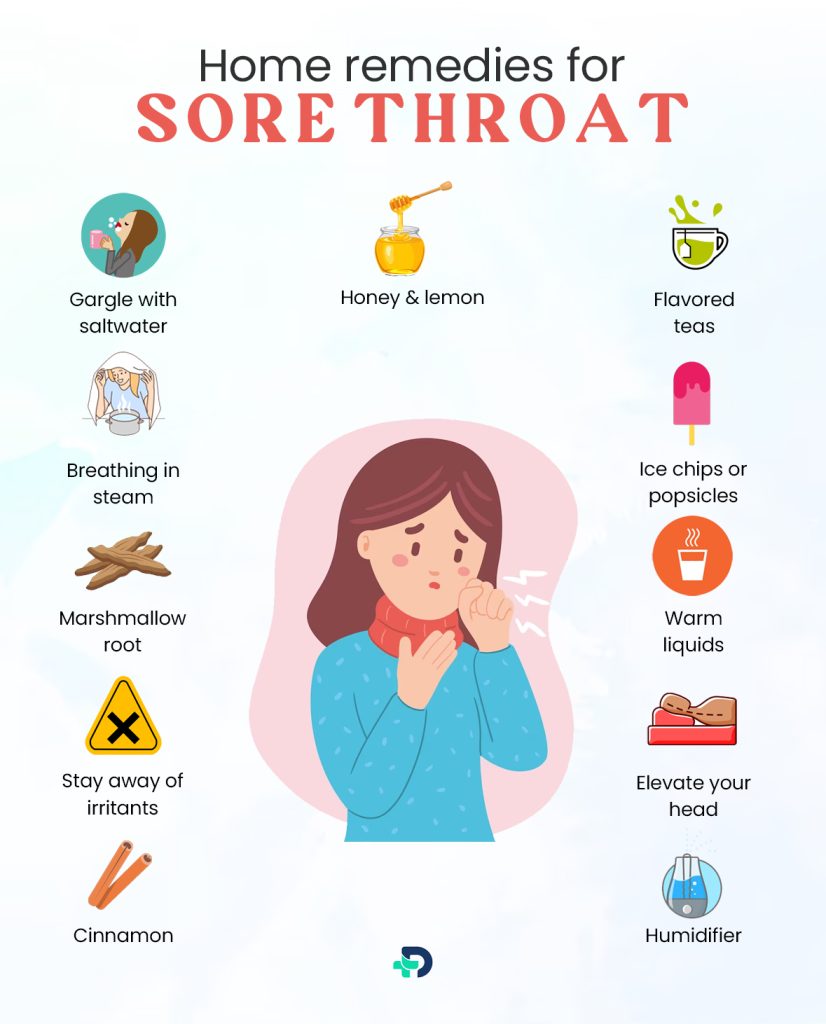Sore Throat: Causes, Symptoms and Management

- Sore throat
- 01 Sep 2023
Introduction
Introduction
A common condition known as a sore throat is characterized by discomfort, irritability, or discomfort in the throat that is frequently made worse by swallowing. Bacterial infections like streptococcal bacteria or viral illnesses like the common cold typically bring it on. A sore throat can also be caused by other things, including allergies, dry air, etc.
This article will examine the causes, symptoms, treatments, and management of sore throats. Join us as we explore this prevalent yet frequently ignored illness to improve knowledge of its causes and potential solutions. 1Introduction | Researched based study from National Library of Medicine

Symptoms
Sore throat Symptoms
- Dryness
- Difficulty swallowing
- Hoarse voice
- Swollen glands
- Cough
- Stuffy nose
- Sneezing
- Fever
- Weakness
Dryness or itchiness
- Pain frequently results from a dryness or itchy feeling in the throat.
- A scratchy or raw sensation in the throat may occur during speaking or swallowing.
Having trouble swallowing
- The soreness could make it painful or uncomfortable.
Hoarseness
- It could be challenging to speak correctly if your voice sounds raspy or hoarse.
Swollen glands
- Your neck’s lymph nodes could swell and feel sensitive to the touch.
Cough
- In particular, if a viral infection brings on a sore throat, a persistent cough may accompany it.
A stuffy nose
- It may occasionally be a symptom of a cold, which may also involve a runny or stuffy nose.
Sneezing
- Sneezing may occur if allergies are the cause of the sore throat.
Fever
- In some situations, a bacterial infection, such as streptococcal bacteria, is to blame.
Fatigue
- A sore throat, especially one brought on by an infection, might make you feel worn out. 1Symptoms | Researched based study from National Library of Medicine
Causes
What Causes Sore Throat?
Viral infections
- Viral infections like the common cold, flu, and mononucleosis frequently cause sore throats.
Bacterial infections
- The bacterial infection that causes severe strep throat and frequently needs medical treatment with antibiotics is caused by streptococcal bacteria, mainly group A Streptococcus.
Allergy
- Pollen, pet hair, mold, and other allergens can cause allergic reactions that irritate the throat and cause pain.
Dry air
- Breathing dry air during the winter or in a dry area might irritate the throat.
Irritants in the environment
- It can be brought on by exposure to smoke, pollutants, chemicals, or other irritants.
Post-nasal drip
- It might irritate the throat when nasal mucus drops down the back of the throat.
Gastroesophageal reflux disease (GERD)
- Due to stomach acid refluxing into the esophagus, the throat may burn.
Excessive use of voice
- Vocal cord strain can result from shouting, talking loudly, or using your voice frequently.
Breathing through the mouth
- Mouth breathing can dry up and irritate the throat because of nasal congestion.
Tonsillitis
- An infection, typically brings on tonsil inflammation.
Foreign body
- Sometimes, having a foreign body in the throat might cause pain and discomfort.
Cancer
- Even though it is uncommon, some throat cancers can initially manifest as a chronic sore throat.
If your symptoms are frequent or severe, it is suggested that you consult a healthcare profession. 2Causes | Researched based study from National Library of Medicine
Diagnosis
Diagnosis
Medical history, physical examination, and occasionally further testing are often used to diagnose the underlying reason. Here’s a summary of it:
Medical history
- Your symptoms, including when they started, how severe they are, and whether any other symptoms, such as a fever, cough, or runny nose, are present, will be discussed with the medical expert.
- They’ll also ask you whether you recently came into contact with any sick persons or other related information.
Inspection of the body
- The doctor will examine your throat, neck, ears, and nose.
- They’ll be looking for swelling, redness, Inflammation, white spots, and enlarging lymph nodes in the neck.
Mouth swab
- Swabs may be taken to check for streptococcal germs if a bacterial infection such as strep throat is suspected.
Rapid strep test
- A quick strep test can reveal the results if bacteria are in the throat.
Test of culture
- A throat culture could be performed to confirm the diagnosis if the rapid strep test is negative but strep throat is still suspected.
Blood test
- Blood tests may occasionally be performed to look for signs of infection, mainly if the symptoms are severe or not improving.
Additional tests
- Depending on the suspected reason, additional tests, such as allergy or other specialized tests, may be advised. 3Diagnosis | Researched based study from National Library of Medicine
Management
Management of Sore Throat
The primary causes of a sore throat determine how it should be treated. The following are some generic methods for treating the symptoms:
Hydration and sleep
- Your body can fight infections and soothe the throat by getting enough rest and staying hydrated.
Throat lozenges or spray
- Tablets can be sucked on, or throat sprays can be applied to relieve throat irritation temporarily.
Over-the-counter painkillers
- Acetaminophen and other over-the-counter painkillers can help lessen pain and Inflammation.
(If bacterial) Antibiotics
- If a bacterial disease, such as strep throat, is the most likely cause, antibiotics may be given.
Allergy medications
- Antihistamines and other allergy drugs can help with symptoms if allergies are the cause.
Manage reflux
- Acid reflux can be controlled with lifestyle modifications and medications if GERD is a factor.
Viral infection control
- Treatment for viral infections, such as the common cold or flu, primarily focuses on symptom management.
- Rest, alcoholic beverages, and over-the-counter drugs are all effective ways to get relief.
Consult a physician
- See a doctor for an accurate diagnosis and treatment if your symptoms are severe, persistent, or worsen, or if you have trouble breathing, a high fever, or any other alarming signs. 4Management | Researched based study from Science Direct
Home Remedies

Household remedies
Gargle with saltwater
- Gargling Inflammation can be reduced by adding half a teaspoon of salt to a glass of warm water.
Honey and lemon
- Drinking warm water with additional honey and lemon can be beneficial.
- While lemon offers vitamin C, it has inherent antimicrobial qualities and can coat the throat.
Flavored teas
- Herbal teas can be calming and hydrating.
- Examples of such teas are chamomile, ginger, and slippery elm.
Marshmallow root
- Because it contains mucilage, marshmallow root tea or tablets can be used to soothe Inflammation.
Warm liquids
- Sip on warm liquids like broth, clear soup, or warm water with honey to moisten the throat.
Cinnamon
- A pinch of cinnamon powder is also effectively dissolved in warm water with honey.
Ice chips or popsicles
- Popsicles and Ice chips can temporarily soothe the throat by numbing it.
Breathing in steam
- Steam from a bowl of hot water can soothe irritation and moisturize the throat.
Humidifier
- Your throat can avoid being too dry by adding moisture to the air in your home using a humidifier.
Give your voice a rest
- Taking a break from using your voice can aid in healing if the problem is brought on by excessive use.
Stay away of irritants
- Steer clear of irritants like smoke, cigarette smoke, and other environmental irritants.
Elevate your head
- By sleeping with your head slightly elevated, post nasal drip and discomfort might be reduced. 5Management | Researched based study from Research Gate
Prevention
Ways to Avoid getting a Sore Throat
- Wash your hands often with soap and water, particularly after being in crowded areas or touching anything that might be contaminated.
- Cover your mouth and nose with a tissue or the inside of your elbow to stop the spread of germs when coughing or sneezing.
- A sore throat may be brought on by close contact with persons with the flu or other ailments, which can spread germs.
- You can avoid irritation by staying hydrated by drinking plenty of liquids.
- A balanced diet high in fruits, vegetables, and whole grains helps boost your immune system, reducing your susceptibility to infections.
- By engaging in regular physical activity, you can strengthen your immune system and overall health.
- Avoid smoking
- Take the necessary precautions and be informed about any local infection outbreaks.
- To enhance your immune system’s capacity to fend off infections, ensure you are receiving adequate sleep.
- If you have allergies, try limiting your contact with substances that irritate your throat. 6Prevention | Researched based study from National Library of Medicine
Any feedback on this article?
 This Articles content was accurate
This Articles content was accurate Very Informative Article
Very Informative Article I have a question or a comment
I have a question or a comment
 This article contains inaccurate content
This article contains inaccurate content This article was not helpful
This article was not helpful I have a question or a comment
I have a question or a comment
We appreciate your helpful feedback!
Checkout our social pages
References
-
National Library of Medicine
Introduction | Symptoms
-
National Library of Medicine
Causes
-
National Library of Medicine
Diagnosis
-
Science Direct
Management
-
Research Gate
Management | Home Remedies
-
National Library of Medicine
Prevention






































